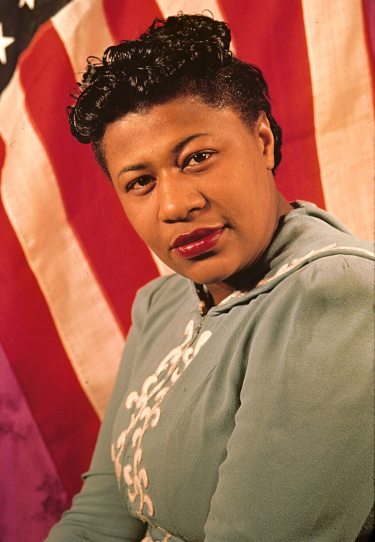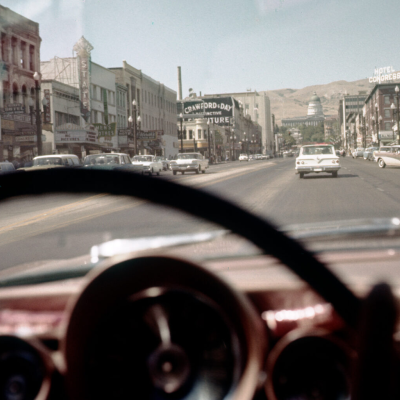The Quick Hands of Hampton Hawes
For years, the autobiography proved elusive,
speeding east like the double-jointed run
that skipped from white keys to black,
soldiers chased from Central Avenue battles.
Then the book took a rest, hiding out
in a nondescript store among academic texts,
tomes whose covers bore geometric shapes.
Cardboard screamed orange, red, and white,
the slow burn of a prison term, the turn
for this man to be heard. Long out of print
it emerged, crackles of four-letter newborns
returning to the mouth that boasted.
Days after Raise Up Off Me slipped free
from its vertical inmates, the store vanished.
Townsfolk would debate its existence as they gazed
into the orange-red-white sunset accompanied
by bloated-afro cumulus, the last rays stretched
toward the Steinway-silhouetted darkness, welcoming.
_____
photo by Francis Wolff
Leaving J.J. Johnson Alone
The man in his late 60s walks unaccompanied along a foot-wide stream. He crosses paths with a young music writer who wants to greet him but knows too much to know what to say. The man doesn’t make eye contact or show any expression. The writer watches the man who once posed for Wolff under a slice of trombone-shaped shadow, the man who now keeps such an easy pace that it would seem impossible for him to be the same man who tore like whitecaps through charts, turning unwieldy notes into light washes of fingerprints on taut Indiana autumn. If he were to stand still, the man would look as if he were cut from local limestone. Later, the writer will read the man’s wife had just passed away.
_____
Love Supreme: Elements of a Four-Part Hymn
- Acknowledgement. Elvin Jones tosses in a stone, making the slightest splash with cymbal, stirring John Coltrane’s serpent tenor to emerge from serene waters. McCoy Tyner takes block chords and builds a raft, knowing he’ll get through. Then Jimmy Garrison’s bass bobs fearlessly, fluid as a porpoise: Duh-DA-duh-DA. All men join in a seaweed chorus, chanting a simple hymn to the Almighty, to the One who added salt to tides and chop to the sea’s magnificent whispers.
- Resolution. Coltrane returns, cutting rocks, cut-cut-cutting, a brass chisel in black hands. He keeps uncovering, looking deep in the earth, as if he’s lost the element, that element that only he has seen, as if he buried it thousands of years ago and can’t remember where he left it. Tyner comes to aid excavation, offering an ivory-and-mahogany shovel. Garrison splits his wooden womb. Use this, he says. It can be twin wheelbarrows. Jones appears with two sticks, stirring away silt: We will get to the bottom, John…
- Pursuance. Now Jones’ sticks turn to rotor blades. Drummer becomes circular, a whirring helicopter. Coltrane enters as a sleek goose, barking, arguing, asking how two beings can fly so differently. Tyner and Garrison, logically omniscient, huddle behind safe clouds, absorb gases of discord, echo puffy shadows, and brace for the tumult that lurks in storms a ray of light away. Jones dabs on thunder behind Coltrane’s lightning, and both flash and crash violently. Then they crawl away, spent, relaxing to see what’s left of the earth they’ve altered. Garrison awakens, walking along like a crab on a sliver of driftwood, confident but quiet. He proves clashing elements can grow, not destroy. He proves earth is ready for the new.
- Psalm. It winds down in fiery truth potion, calming, as spirits warm confidently with no more eruption. They all blend now, Coltrane overlapping Tyner, Jones rolling over Garrison, blue flames soothing. Embers remain, flourishing as coals touch souls, as fuel slips through so slowly, purifying all. A seemingly infinite search has led to a communal cauldron, where hopes boil into dreamy broths. A slow wind rearranges embers, spreading them to let them cool, only slightly. The wind forms a circle of coals, nudging the men to acknowledge His presence once again. A mysterious voice speaks, floating beside Coltrane, Tyner, Garrison, and Jones. Who brings beauty full circle? Only a close friend knows.
__________

Daniel M. Shapiro is the author of How the Potato Chip Was Invented (sunnyoutside press), Heavy Metal Fairy Tales (Throwback Books), and The 44th-Worst Album Ever (NAP Books). He is the reviews and poetry editor of Pittsburgh Poetry Review.
*
Hampton Hawes Trio, 1974






































